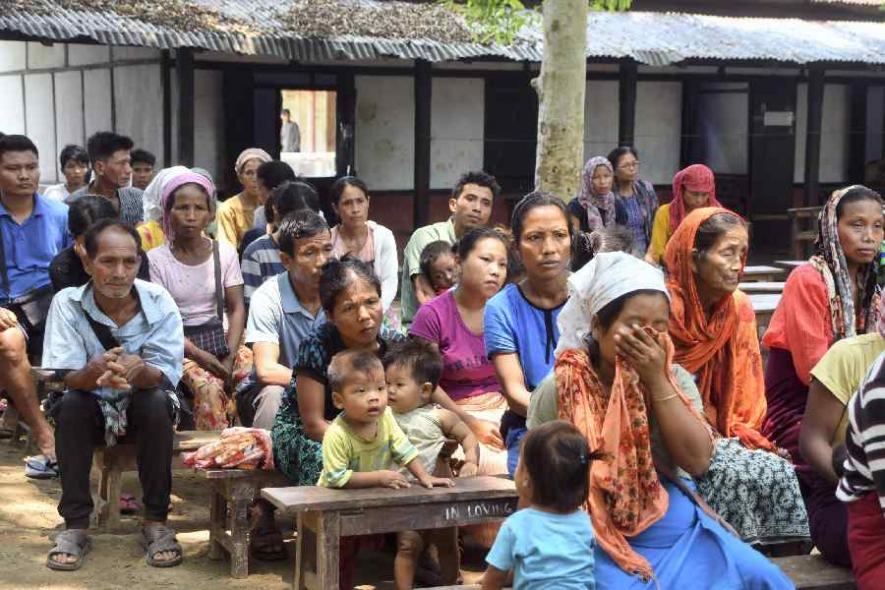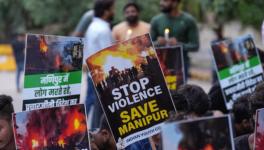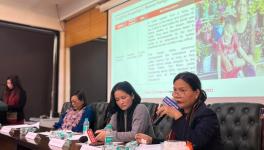Manipur: Amid Hard Economic Issues, Demand for PDS Under Centre's Watch

People of violence-hit areas of Manipur at a relief camp setup by the Assam Government, in Cachar district of Assam. Representational Image. Image Courtesy: PTI
Kolkata: Hard economic issues, such as budgetary allocation to the Manipur government's tribal affairs & hills department, expenditure and diversion therefrom, reforms in the existing plains/valley and hills arrangement are as important as a mechanism to address the "political aspirations" of the people of the hills who send 20 MLAs to the Manipur Assembly, which is a 60-member House. This means the plains/valley electorate sends 40 members to the House.
In the highly disturbed situation prevailing in the state since May 3, when ethnic violence erupted and which has made life challenging and insecure, particularly for common people, one demand voiced by the Indigenous Tribal Leaders' Forum (ITLF), which is a conglomerate of recognised tribes in Churachandpur district of Manipur, is for an urgent streamlining of the public distribution system (PDS).
"We demand that the Union government assume total responsibility for the supply of essential commodities to affordable prices. We cannot depend any more on the Manipur government to get justice in this regard. Things have come to such a pass that tribal families of ordinary means have become dependent on supplies by road from Mizoram to the southwest of Manipur. The discriminatory treatment by the Meiteis (non-tribals)-dominated administration is manifest in several actions of the administration. Our wards staying in hostels are being threatened to leave and not return. From this one example, you can gauge the gravity of the situation", ITLF secretary Muan Tombing told NewsClick.
"If PDS is taken care of by the Centre fully, we will be assured of essential supplies for existence," Tombing added.
Allocation in the annual budget is not the last word. The allocated funds have to be efficiently deployed for the welfare of the people of the hills.
The actual expenditure may be much less than the allocation.
"I wonder if it is more than 20%."
The sources of funding for the department are the normal state plan, special central assistance to tribal sub-plan, grants under Article 275 (1) of the Constitution, Centrally-sponsored schemes on 100%, 90:10 and 50:50 funding by the Centre and the state government, Non-lapsable Central Pool of Resources and the North-Eastern Council.
The Manipur government constituted a committee on August 25, 2021, to examine the funds released to the districts over the last 10 years. The committee compared the development funds released for the hill districts against the government's overall annual development expenditure.
The committee noticed a fluctuating trend for several years but also found the situation showing improvement from 2017-18, which was possible because of higher spending by several departments, including tribal affairs & hills, PWD, planning, rural development and public health engineering.
The report significantly observed that implementing a few major projects leads to a skewed fund distribution between hill and valley districts and between different hill districts, which was seen mainly in beneficiary-based schemes. A district with a large population gets a large share of scheme funds. It was felt desirable to move away from the hill-valley allocation system to the tribal sub-plan concept, which is practised in respect of special Central assistance.
It appears the study favoured a composite tribal sub-plan to be financed from a pool of state allocation and special Central assistance. This will, over time, help create an institutionalised administrative mechanism that will facilitate better monitoring of fund utilisation, explained knowledgeable quarters.
The committee observed that there are projects expenditure which cannot be divided on a hill-valley basis. Projects taken up in the valley also serve the hill areas. Again, there may be projects that benefit the entire state.
As is known, the sharp ethnic divide and widespread clashes from May 3, leading to deaths and destruction, followed the 10-year-old Meitei community's demand, which initially received a shot-in-the-arm from a single Manipur High Court judge ruling, for ST status [demand first raised in 2012].
The land is the root cause for the demand in that the Meities have been kept away from the hills though tribals can buy land in the Imphal valley. Even as the population of the Meities dropped from 59% in 1959 to 44$ in 2011, the tribals gained because of the influx from Myanmar, more so from 2021 when the Junta assumed control.
New villages came up in the hill areas, opium cultivation, though banned, gained currency to earn a livelihood, and illegal activity increased. The valley has only 10% of Manipur's geographical area. Still, it has a much larger population relative to the hills, which account for 90% of the geographical area but has a lower population despite the influx from Myanmar.
An ST tag for the Meiteis will decrease the share of benefits accruing to the tribals because of their ST status. The Hill Areas Committee of the Manipur Assembly, established under Article 371C of the Constitution, has frowned upon the Meities' demand, provoking the latter to accuse HAC of reneging on its 'status quo' assurance and threaten legal action "should circumstances warrant their going to that extent."
Union home minister Amit Shah, who ultimately decided to visit Imphal on May 29 and for whom briefing by MoS for home Nityanand Rai and party's Manipur-in-charge Sambit Patra, who together reached the state capital on May 25, will form the basis for beginning reconciliation exercise.
But, there are some knotty issues. Strong police action by the state government in the forested areas of the hills and uprooting of opium trees was possible because of chief minister N Biren Singh's decision to unilaterally withdraw the state government from the tripartite (Centre, state and militant outfits' representatives) agreement on Suspension of Operations (SoO).
As this has triggered what the state has witnessed and ultimately forced the authorities to deploy the Army for an extensive and intensive combing drive, Shah has to decide whether to stand by the chief minister or reverse his decision.
SoO has been in force since 2008, and it was extended by end-February for a year with effect from March 1, 2023.
Kuki National Organisation and United People's Front, two umbrella outfits of rebel groups, have suggested that New Delhi and ruling BJP leadership gave enough indications, "corroborated" by Shah at the public meeting he addressed at Churchandpur on February 23, 2022, of early steps to address their "political aspirations".
Taking note of what they considered the "reassuring word", both the umbrella organisations offered their support to BJP for the Assembly election then scheduled on February 28 and March 5, 2022, and this election gave the party an absolute majority.
It remains to see how New Delhi honours its "reassuring words." Because of the confrontationist stance of HAC and Meitei organisations on the latter's ST status demand, it remains to be seen whether the Manipur House will have normal sessions in the days ahead.
The writer is a Kolkata-based senior freelance journalist. Views are personal.
Get the latest reports & analysis with people's perspective on Protests, movements & deep analytical videos, discussions of the current affairs in your Telegram app. Subscribe to NewsClick's Telegram channel & get Real-Time updates on stories, as they get published on our website.
























